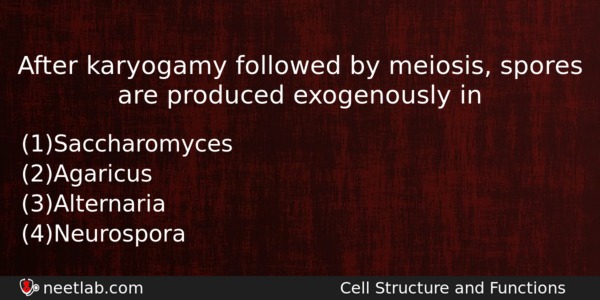| ⇦ | 
| ⇨ |
After karyogamy followed by meiosis, spores are produced exogenously in
Options
(a) Saccharomyces
(b) Agaricus
(c) Alternaria
(d) Neurospora
Correct Answer:
Agaricus
Explanation:
In Agaricus (a genus of basidiomycetes), basidiospores or meiospores are produced exogenously.Neurospora (a genus of ascomycetes) produces ascospores as meiospores but endogenously inside the ascus.).• Alternaria (a genus of deuteromycetes) does not produce sexual spores.• Saccharomyces (Unicellular ascomycetes) produces ascospores, endogenously.
Related Questions: - Renal portal system is absent in
- The process after glycolysis in anaerobic respiration is known as
- The swelling in any part of our body, caused by infiltration of serum into
- The cells of cyanobacteria and bacteria exhibit similarity in having
- What causes a green plant exposed to the light on only one side, to bend toward
Topics: Cell Structure and Functions
(413)
Subject: Biology
(4253)
Important MCQs Based on Medical Entrance Examinations To Improve Your NEET Score
- Renal portal system is absent in
- The process after glycolysis in anaerobic respiration is known as
- The swelling in any part of our body, caused by infiltration of serum into
- The cells of cyanobacteria and bacteria exhibit similarity in having
- What causes a green plant exposed to the light on only one side, to bend toward
Topics: Cell Structure and Functions (413)
Subject: Biology (4253)
Important MCQs Based on Medical Entrance Examinations To Improve Your NEET Score
18000+ students are using NEETLab to improve their score. What about you?
Solve Previous Year MCQs, Mock Tests, Topicwise Practice Tests, Identify Weak Topics, Formula Flash cards and much more is available in NEETLab Android App to improve your NEET score.
Share this page with your friends

Leave a Reply